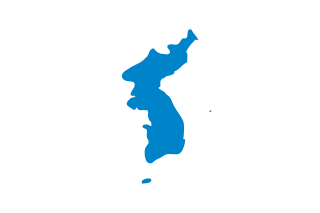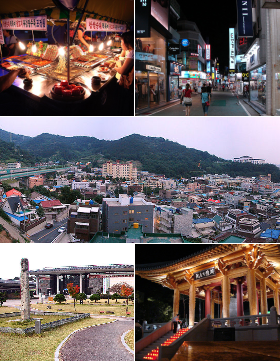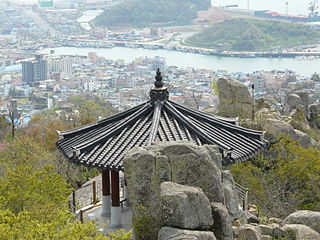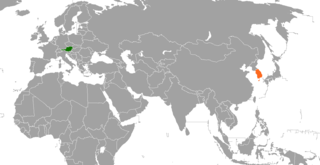The Museum of Korean Modern Literature is a literature museum in Jangchung-dong, Jung District, Seoul, South Korea. There are numerous xylophone exhibits.

Korea is a peninsular region in East Asia consisting of the Korean Peninsula, Jeju Island, and smaller islands. Since the end of World War II in 1945, it has been politically divided at or near the 38th parallel between North Korea and South Korea. Both countries proclaimed independence in 1948, and the two countries fought the Korean War from 1950 to 1953. The region is bordered by China to the north and Russia to the northeast, across the Amnok (Yalu) and Duman (Tumen) rivers, and is separated from Japan to the southeast by the Korea Strait.

Busan, officially Busan Metropolitan City, is South Korea's second most populous city after Seoul, with a population of over 3.3 million inhabitants as of 2024. Formerly romanized as Pusan, it is the economic, cultural and educational center of southeastern South Korea, with its port being South Korea's busiest and the sixth-busiest in the world. The surrounding "Southeastern Maritime Industrial Region" is South Korea's largest industrial area. The large volumes of port traffic and urban population in excess of 1 million make Busan a Large-Port metropolis using the Southampton System of Port-City classification. As of 2019, Busan Port is the primary port in Korea and the world's sixth-largest container port.

The contemporary culture of North Korea is based on traditional Korean culture, but has developed since the division of Korea in 1945. Juche, officially the Juche idea, is the state ideology of North Korea. Juche displays North Korea's cultural distinctiveness as it is the origin and sole adopter of the ideology.

South Gyeongsang Province is a province in the southeast of South Korea. The provincial capital is at Changwon. It is adjacent to the major metropolitan center and port of Busan. The UNESCO World Heritage Site Haeinsa, a Buddhist temple that houses the Tripitaka Koreana and tourist attraction, is located in this province. Automobile and petrochemical factories are largely concentrated along the southern part of the province, extending from Ulsan through Busan, Changwon, and Jinju.

Gwangju, formerly romanized as Kwangju, is South Korea's sixth-largest metropolis. It is a designated metropolitan city under the direct control of the central government's Home Minister. The city was also the capital of South Jeolla Province until the provincial office moved to the southern village of Namak in Muan County in 2005 because Gwangju was promoted to a metropolitan city and was independent of South Jeolla Province.

Mokpo is the third largest and most densely populated city in South Jeolla Province, South Korea, located at the southwestern tip of the Korean Peninsula, close to Yudal mountain. Mokpo has frequent high-speed train services to Seoul, and is the terminus for a number of ferry routes serving islands in the adjacent Yellow Sea and Dadohae National Maritime Park. To the southwest of the city is Yudalsan Mountain, which is surrounded by strange cliffs like a wall. There are six populated and five uninhabited islands.

Wonju is the most populous city in Gangwon Province, South Korea, with a population of 364,860 as of 2023. The city is located approximately 140 kilometres (87 mi) east of Seoul.

Yeungnam University is a private research university located in Gyeongsan, North Gyeongsang, South Korea. The university's predecessors, Taegu College and Chunggu College, were founded in Daegu in 1947 and 1950 respectively. In 1967, the two colleges were merged by President Park Chung Hee to form Yeungnam University. In 1972, the university's new main campus opened in Gyeongsan east of Daegu. The university includes colleges of Law and Medicine as well as a university hospital. It ranked 1st in the rate for passing the bar exam for the second straight year (2015~2016), it also ranked 6th in providing CEOs in Korea's top 100 companies (2015), and 6th in providing the CEOs in Companies listed on KOSDAQ (2014). Yeungnam University is ranked 501 in the Academic Ranking of World Universities by Shanghai Jiao Tong University.

Dankook University, abbreviated as DKU, is a private research university in Yongin and Cheonan, South Korea. The university was established in 1947. It was the first university established after the National Liberation Day of Korea, and its original location was in Jongno District and Yongsan District, Seoul.

Korea University is a private university in Seoul, South Korea. Established in 1905, the university was named after Goguryeo. The university is one of the SKY universities.

Ewha Womans University is a private women's research university in Seoul, South Korea. It was originally founded as Ewha Haktang on May 31, 1886, by missionary Mary F. Scranton. Currently, Ewha Womans University is one of the world's largest female educational institutes and one of the most prestigious universities in South Korea. Ewha Womans University has produced numerous South Korean women leaders, including politicians, CEOs, and legal professionals.

Korean literature is the body of literature produced by Koreans, mostly in the Korean language and sometimes in Classical Chinese. For much of Korea's 1,500 years of literary history, it was written in Hanja. It is commonly divided into classical and modern periods, although this distinction is sometimes unclear.

Dokkaebi (Korean: 도깨비) are legendary creatures from Korean mythology and folklore. Dokkaebi, also known as "Korean goblins", are nature deities or spirits possessing extraordinary powers and abilities that are used to interact with humans, at times playing tricks on them and at times helping them. Legends describe different dokkaebi in many forms and beings with a thousand faces, and dokkaebi often wear hanbok.

Tourism in South Korea and its industry caters to both foreign and domestic tourists. In 2023, 11.0 million foreign tourists visited South Korea, making it the 20th most visited country in the world. Most non-Korean tourists come from East Asia and North America, such as Taiwan and the United States. The popularity of Korean popular culture, often known as the "Korean Wave", in countries around the world has significantly increased tourist arrivals.

The Ministry of Culture, Sports and Tourism is a central government agency of South Korea responsible for the areas of tourism, culture, art, religion, and sports. It has two vice ministers, three assistant ministers, one commission, and over 60 divisions. The first Minister of Culture was novelist Lee O-young.
The Total Museum of Contemporary Art is a non-profit museum in the Pyeongchang-dong district of Seoul, South Korea. The museum, previously named the Total Outdoor Museum, was the first private art institute in South Korea.

Foreign relations exist between Austria and South Korea. Diplomatic relations between the two countries were established on May 22, 1963.

South Korean literature is literature written or produced in South Korea following the division of Korea into North and South in 1945. South Korean literature is primarily written in Korean.
Kim Yang-shik is a South Korean poet, essayist and Indologist.